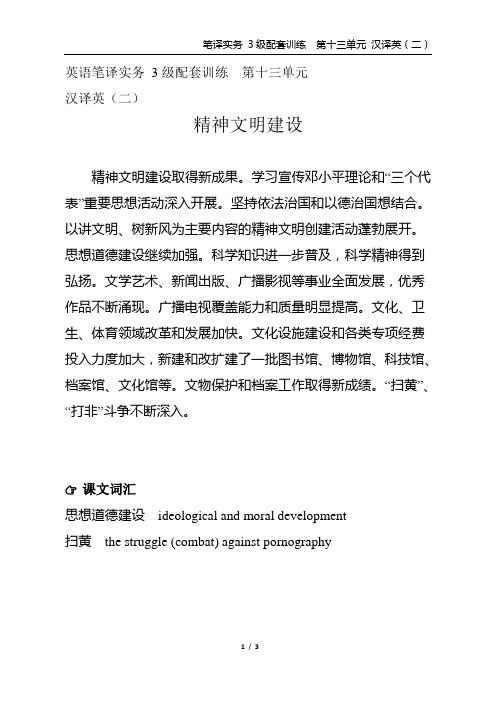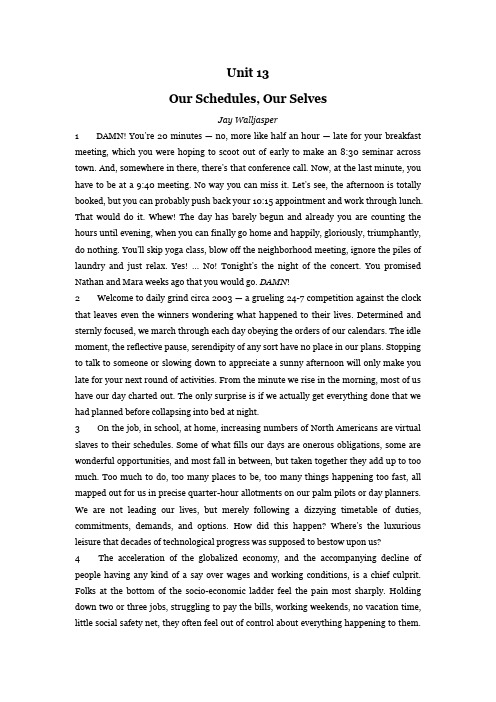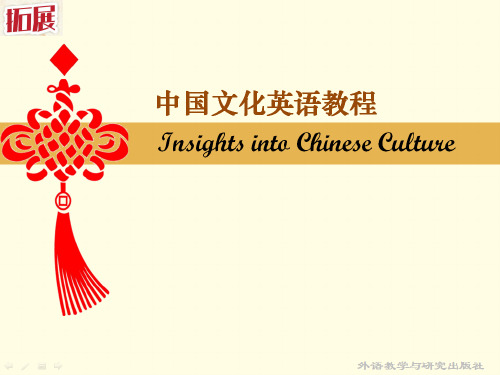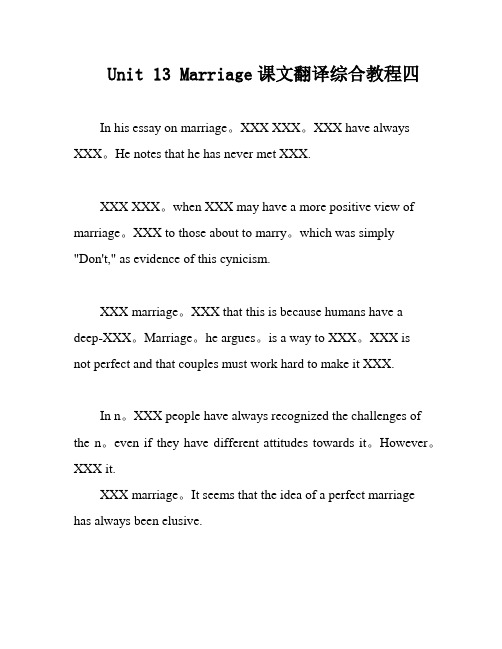大学英语翻译教程第十三单元 文档资料
121301英汉互译E-C13

• • • • •
2、逻辑判断。 B and C的译文根本不可以和前后的意思连在一起。 成为一个镇,应该经济发达一些。 为什么有的地方叫镇,而有的地方叫乡呢? 3、如何注意理解原文中 such an attempt would be hopelessly impossible. • 是根本不可能有这个attempt, • • • • • 从实例理解翻译,学习技巧。 P185 (3) necessary evil ,n. 无可避免之灾祸 学习The highway is a necessary evil的灵活译法。 学习approve(批准)和approve of (赞成)的用法。
3
• • • • • • • • •
2、He looked every inch a king. P164 -2。体现有无认真听课,有无注意点明的重点。 他有王者风范。 3、What happens just now is said that the light is reflected. the light is reflected,语法角色的转换。 is said的真意,和 it is said的区别。 刚才发生的现象叫光的反射。 • 更正—— 开放改革以来——Since the implementation of the reform and opening up policy in 1978. (谢谢一位同学的更正)
• 1、汉语写作的思路,像写日记那样,先点明日期与天气状况, 那么就有了课文译文的第一句。加上“这一天”就和下面的意思 更有倚重内在的联系。
• 2、为什么把天气情况先写(译)出来? • 起烘托气氛、激发联想的作用。 • 这是翻译过程表达的高级阶段——信息重组了。
8
• P 178 例2 • Books vary in length from 60,000 to 100.000 words. The average is about 75.000. • length不作长度, average,做“平均的(篇幅)”解。 原文还可以写成—— • Books vary in length from 60,000 to 100.000 words, the average being about 75.000. • Books vary in length from 60,000 to 100.000 words, with an average of about 75.000. • In one year of average reading by an average reader for 15 minutes a day, 20 books will be read. • 这一句,第一个average,是“一般的(书)”,第2 个是“中等水平的(读者)”
英语口译基础教程Unit 10-13

Unit 10P1The Information Technology Industry council (ITI) is an elite group of the nation’s top high-tech companies and is widely recognized as tech industry’s most effective lobbying organization in Washington. ITI helps member companies achieve their objectives through building relationships with Members of Congress, Administration officials, and foreign governments; organizing industry-wide consensus on policy issues; and working to enact tech-friendly government policies. ITI works to reduce barriers that stifle innovation, increase access to global markets, promote e-commerce expansion, protect consumer choice, and enhance the global competitiveness of our companies.信息技术产业协会(ITI)是一个国内顶尖高科技公司组成的精英团队,被公认为是业界在华盛顿最有效的游说组织。
ITI协助会员通过与国会议员、行政官员及外国政府建立关系实现公司目标;组织全行业在政策问题上达成共识;制定有利于技术发展的政府政策。
ITI致力于减少阻碍创新的障碍,扩大进入全球市场的机会,促进电子商务的扩展,保护消费者的选择权以及增强会员的全球竞争力。
英语笔译实务 3级配套训练 第十三单元 汉译英(二)精神文明建设

笔译实务3级配套训练第十三单元汉译英(二)英语笔译实务3级配套训练第十三单元汉译英(二)精神文明建设精神文明建设取得新成果。
学习宣传邓小平理论和“三个代表”重要思想活动深入开展。
坚持依法治国和以德治国想结合。
以讲文明、树新风为主要内容的精神文明创建活动蓬勃展开。
思想道德建设继续加强。
科学知识进一步普及,科学精神得到弘扬。
文学艺术、新闻出版、广播影视等事业全面发展,优秀作品不断涌现。
广播电视覆盖能力和质量明显提高。
文化、卫生、体育领域改革和发展加快。
文化设施建设和各类专项经费投入力度加大,新建和改扩建了一批图书馆、博物馆、科技馆、档案馆、文化馆等。
文物保护和档案工作取得新成绩。
“扫黄”、“打非”斗争不断深入。
课文词汇思想道德建设ideological and moral development扫黄the struggle (combat) against pornographyUnit 13 汉译英(二)精神文明建设参考译文Cultural and Ethical ProgressFresh achievements (accomplishments) have been made in promoting spiritual civilization. We mad more intensive efforts to study and publicize (disseminate / spread) Deng Xiaoping Theory and the important thought of Tree Represents. We continued to combine rule of law with rule by virtue. Activities aimed at developing socialist culture and ethics and promoting a new code of conduct among the people swept across the country. More emphasis was placed on ideological and moral development. Scientific knowledge was further popularized and the spirit of science spread. Literature and art, the news media and publishing, and radio, film and television developed in an all-round way and continued to bring out (create) fine works in large numbers. Significant progress was made in expanding the area of radio and television reception and raising the quality of their programming (The area of radio and television reception was enlarged significantly and the quality of programming raised.) Reforms and development in culture, health and sports were accelerated. (Momentum was added to reforms and progress in culture, health and sports). More funds were put in to building cultural facilities and various special items. We built,笔译实务3级配套训练第十三单元汉译英(二)renovated and expanded libraries, museums, science centers, archives and cultural centers. Fresh progress was made in the preservation of cultural relics and in archive-related work (projects). Our struggle (combat) against pornographic and illegal publications continuously deepened (continued to intensify).。
综合英语教程(第三版)BOOK2-课文译文 13.第十三单元

Unit 13TEXT有这么一天加夫列尔•加西亚•马尔克斯(Gabriel García Márquez)星期一,天刚亮,暖暖的,没有下雨。
奥雷里奥•埃斯科瓦尔(Aurelio Escovar)是一位没有学位的的牙医。
今天他起得很早,六点钟就开始工作了。
他从玻璃柜中取出一些还套着石膏模具的假牙,然后又取出一些工具,按照大小顺序一一摆在桌子上,就像是展览一样。
这位牙医穿着一件无领条纹衬衫,领口上有颗金色的纽扣,裤子用背带吊着。
身材挺拔而清瘦,可那种心不在焉的样子,好像只有聋子才会有的那种表情。
把这些东西在桌上摆好之后,他把牙钻拉到牙科治疗椅旁边,便坐在椅子上开始打磨假牙了。
他看起来漫不经心,似乎没有想过自己正在做什么,只是不停地干活,即使不需要的时候,他还是用脚给钻床打气。
过了八点钟了,他停下来休息了一会儿,透过窗户看了看天空,两只忧郁的秃鹰伫立在邻家房屋的栋梁上对着太阳晾晒自己的羽毛。
他继续工作着,心里想午饭前还会下雨的。
可是,十一岁儿子的叫喊声打断了他的思绪。
“爸爸。
”“什么事?”“市长问你能不能给他拔牙。
”“告诉他我不在。
”他正在打磨一颗金牙。
他拿起这颗金牙,眯着眼仔细端详着。
儿子的声音从在那间小小的候诊室里又传了过来。
“他说你在,因为他能听到你说话。
”牙医还是仔细地端详那颗假牙。
只有他干完活把假牙放到桌子上时,他才说道:“这下就好多了。
”接着,他又开始操作牙钻了。
他从一个装满必备用品的纸箱里拿出齿桥的几个构件,然后开始打磨那颗金牙。
“爸爸。
”“什么事?”他的表情没有丝毫的变化。
“他说如果你不给他拔牙,他就开枪毙了你。
”牙医不紧不慢,动作极其平缓,他停止踩踏钻床,把牙钻从椅子跟前推开,把桌子最下面的抽屉拉开,里面有一把左轮手枪。
“好吧,”他说,“让他进来毙了我。
”他把椅子转了一下正对着门,把手放在抽屉边上。
这时,市长出现在门口,他的左脸修得很干净,但是右脸就不一样了,肿胀和疼痛,五天都没刮胡须了。
(完整word版)Unit 13 Our Schedules, Our Selves课文翻译综合教程三

Unit 13Our Schedules, Our SelvesJay Walljasper1 DAMN! You’re 20 minutes — no, more like half an hour — late for your breakfast meeting, which you were hoping to scoot out of early to make an 8:30 seminar across town. And, somewhere in there, there’s that conference call. Now, at the last minute, you have to be at a 9:40 meeting. No way you can miss it. Let’s see, the afternoon is totally booked, but you can probably push back your 10:15 appointment and work through lunch. That would do it. Whew! The day has barely begun and already you are counting the hours until evening, when you can finally go home and happily, gloriously, triumphantly, do nothing. You’ll skip yoga class, blow off the neighborhood meeting, ignore the piles of laundry and just relax. Yes! … No! Tonight’s the night of the concert. You promised Nathan and Mara weeks ago that you would go. DAMN!2 Welcome to daily grind circa 2003 — a grueling 24-7 competition against the clock that leaves even the winners wondering what happened to their lives. Determined and sternly focused, we march through each day obeying the orders of our calendars. The idle moment, the reflective pause, serendipity of any sort have no place in our plans. Stopping to talk to someone or slowing down to appreciate a sunny afternoon will only make you late for your next round of activities. From the minute we rise in the morning, most of us have our day charted out. The only surprise is if we actually get everything done that we had planned before collapsing into bed at night.3 On the job, in school, at home, increasing numbers of North Americans are virtual slaves to their schedules. Some of what fills our days are onerous obligations, some are wonderful opportunities, and most fall in between, but taken together they add up to too much. Too much to do, too many places to be, too many things happening too fast, all mapped out for us in precise quarter-hour allotments on our palm pilots or day planners. We are not leading our lives, but merely following a dizzying timetable of duties, commitments, demands, and options. How did this happen? Where’s the luxurious leisure that decades of technological progress was supposed to bestow upon us?4 The acceleration of the globalized economy, and the accompanying decline of people having any kind of a say over wages and working conditions, is a chief culprit. Folks at the bottom of the socio-economic ladder feel the pain most sharply. Holding down two or three jobs, struggling to pay the bills, working weekends, no vacation time, little social safety net, they often feel out of control about everything happening to them.But even successful professionals, people who seem fully in charge of their destinies, feel the pinch. Doctors, for example, working impossibly crowded schedules under the command of HMOs, feel overwhelmed. Many of them are now seeking union representation, traditionally the recourse of low-pay workers.5 The onslaught of new technology, which promised to set us free, has instead ratcheted up the rhythms of everyday life. Cell phones, e-mail, and laptop computers instill expectations of instantaneous action. While such direct communication can loosen our schedules in certain instances (it’s easier to shift around an engagement on short notice), overal l they fuel the trend that every minute must be accounted for. It’s almost impossible to put duties behind you now, when the boss or committee chair can call you at a rap show or sushi restaurant, and documents can be e-mailed to you on vacation in Banff or Thailand. If you are never out of the loop, then are you ever not working?6 Our own human desire for more choices and new experiences also plays a role. Just like hungry diners gathering around a bountiful smorgasbord, it’s hard not to pile too many activities on our plates. An expanding choice of cultural offerings over recent decades and the liberating sense that each of us can fully play a number of different social roles (worker, citizen, lover, parent, artist, etc.) has opened up enriching and exciting opportunities. Spanish lessons? Yes. Join a volleyball team? Why not. Cello and gymnastics classes for the kids? Absolutely. Tickets to a blues festival, food and wine expo, and political fundraiser? Sure. And we can’t forget to make time for schoo l events, therapy sessions, protest rallies, religious services, and dinner with friends.7 Yes, these can all add to our lives. But with only 24 hours allotted to us each day, something is lost too. You don’t just run into a friend anymore and decide to get coffee. You can’t happily savor an experience because your mind races toward the next one on the calendar. In a busy life, nothing happens if you don’t plan it, often weeks in advance. Our “free” hours become just as programmed as the work day. What begins as an idea for fun frequently turns into an obligation obstacle course. Visit that new barbecue restaurant. Done! Go to tango lessons. Done! Fly to Montreal for a long weekend. Done!8 We’ve booked ourselves so full of prescheduled activities there’s no time left for those magic, spontaneous moments that make us feel most alive. We seldom stop to think of all the experiences we are eliminating from our lives when we load up our appointment book. Reserving tickets for a basketball game months away could mean you miss out on the first balmy evening of spring. Five p.m. skating lessons for your children fit so conveniently into your schedule that you never realize it’s the time all the other kids in the neighborhood gather on the sidewalk to play.9 A few years back, radical Brazilian educator Paulo Freire was attending a conference of Midwestern political activists and heard over and over about how overwhelmed people felt about the duties they face each day. Finally, he stood up and, in slow, he avily accented English, declared, “We are bigger than our schedules.” The audience roared with applause.10 Yes, we are bigger than our schedules. So how do we make sure our lives are not overpowered by an endless roster of responsibilities? Especially in an age where demanding jobs, two-worker households or single-parent families make the joyous details of everyday life -- cooking supper from scratch or organizing a block party — seem like an impossible dream? There is no set of easy answers, despite what the marketers of new convenience products would have us believe. But that doesn’t mean we can’t make real steps to take back our lives.11 Part of the answer is political. So long as Americans work longer hours than any other people on Earth we are going to feel hemmed in by our schedules. Expanded vacation time for everyone, including part-time and minimum wage workers, is one obvious and overdue solution. Shortening the work week, something the labor movement and progressive politicians successfully accomplished in the early decades of the 20th century, is another logical objective. There’s nothing preordained about 40-hours on the job; Italy, France, and other European nations have already cut back working hours. An opportunity for employees outside academia to take a sabbatical every decade or so is another idea whose time has come. And how about more vacation and paid holidays? Let’s start with Martin Luther King’s birthday, Susan B. Anthony’s birthday, and your own! Any effort to give people more clout in their workplaces —from strengthened unions to employee ownership — could help us gain much-needed flexibility in our jobs, and our lives.12 On another front, how you think about time can make a big difference in how you feel about your life, as other articles in this cover section illustrate. Note how some of your most memorable moments occurred when something in your schedule fell through. The canceled lunch that allows you to spend an hour strolling around town. Friday night plans scrapped f or a bowl of popcorn in front of the fireplace. Don’t be shy about shucking your schedule whenever you can get away with it. And with some experimentation, you may find that you can get away with it a lot more than you imagined.13 Setting aside some time on your calendar for life to just unfold in its own surprising way can also nurture your soul. Carve out some nonscheduled hours (or days) once in awhile and treat them as a firm commitment. And resist the temptation to turn every impulse or opportunit y into another appointment. It’s neither impolite nor inefficient to simply say, “let me get back to you on that tomorrow” or “let’s check in that morning to see if it’s still a good time.” You cannot know how crammed that day may turn out to be, or how un inspired you might feel about another engagement, or how much you’ll want to be rollerblading or playing chess or doing something else at that precise time.14 In our industrialized, fast-paced society, we too often view time as just another mechanical instrument to be programmed. But time possesses its own evershifting shape and rhythms, and defies our best efforts to corral it within the tidy lines of our palm pilots or datebooks. Stephan Rechtschaffen, author of Time Shifting, suggests you think back on a scary auto collision (or near miss), or spectacular night of lovemaking. Time seemed almost to stand still. You can remember everything in vivid detail. Compare that to an overcrammed week that you recall now only as a rapid-fire blur. Keeping in mind that our days expand and contract according to their own patterns is perhaps the best way to help keep time on your side.日程,自我杰伊·沃尔贾斯珀1. 讨厌!迟到了20分钟——不对,差不多半小时了——本来还想着这早餐会议可以早早结束,然后去赶8:30在城市另一端召开的交流会。
(完整版)中国文化英语教程Unit13

Discovery of the Terracotta Army
On either side of central echelon, there is a row of 180 soldiers, as flanks (侧翼) of the formation
Discovery of the Terracotta Army
Discovery of the Terracotta Army
Pit No. 1: over 14,000 square meters, the largest pit of the 4 pits
Discovery of the Terracotta Army
Front echelon (梯队): 3 rows, 210 soldiers with the commander in the front
Half-squatting, half-kneeling Hair tied in a knot Suits of armor over war robes
The posture clearly shows the tension of the process of shooting
Vivid Sculpture
Discovery of the Terracotta Army
Formation 4 A formation of 108 horsemen and 180 saddled horses in 11 rows
Discovery of the Terracotta Army
Pit No. 3 was also discovered in the summer of 1976. (West of Pit No.1) • 凹 shape, smallest, only 68 warriors inside
Unit 13 Marriage课文翻译综合教程四

Unit 13 Marriage课文翻译综合教程四In his essay on marriage。
XXX XXX。
XXX have always XXX。
He notes that he has never met XXX.XXX XXX。
when XXX may have a more positive view of marriage。
XXX to those about to marry。
which was simply "Don't," as evidence of this cynicism.XXX marriage。
XXX that this is because humans have a deep-XXX。
Marriage。
he argues。
is a way to XXX。
XXX isnot perfect and that couples must work hard to make it XXX.In n。
XXX people have always recognized the challenges of the n。
even if they have different attitudes towards it。
However。
XXX it.XXX marriage。
It seems that the idea of a perfect marriage has always been elusive.As for my own experience。
I can say that I have gone from one difficult XXX。
sung by minstrels。
which mocked the idea of marriage and warned of its difficulties。
While it is possible that these performers exaggerated。
Unit 13 篇章翻译(一)

Unit 13 篇章翻译(一)课时:2H教学目的要求:在汉译英中掌握如何恰当地翻译有关旅游的文章。
教学重点:旅游英语口语风格的翻译,背景知识对翻译的重要性。
教学难点:旅游英语中专有名词的翻译。
教学内容:丝绸之路1. 欢迎各位参加“丝绸之路游”,为期两周的游览将成为您一生中最难忘的经历之一。
Welcome to our Silk Road Tour. This two-week tour/ trip/ excursion will (may) turn out to be one of the most unforgettable (memorable) experiences in your life.[丝绸之路游可以翻译成the Silk Road Tour, 但译文中的our 显得更为亲切,因为这是关于为游客服务的内容,起到较好的宣传作用。
另外,汉语预期往往比较率直、绝对、武断,相比之下英语比较含蓄、委婉,可以把“将”弱化为may.]2. 丝绸之路的历史可以追溯到公元前2世纪,当时一名中国官员、朝廷使者张骞沿着这条连接亚欧两大洲的贸易通道出使西域。
The Silk Road can be traced back to (traces back to/ dates back to ) the second century before B.C., when Zhang Qian, a Chinese official and imperial envoy, went on business to Xiyu (the Western Regiion) along this trade route that linked (joined/ connected ) [connecting]Asia and Europe. (结构调整)3. 这条通道源于长安城(今天的西安),一路穿越陕西省、甘肃省境内的河西走廊、新疆塔里木盆地、帕米尔山区、阿富汗、伊朗、伊拉克以及叙利亚,最后抵达地中海的东岸,全程七千公里,其中有四千多公里的路段在中国境内。
- 1、下载文档前请自行甄别文档内容的完整性,平台不提供额外的编辑、内容补充、找答案等附加服务。
- 2、"仅部分预览"的文档,不可在线预览部分如存在完整性等问题,可反馈申请退款(可完整预览的文档不适用该条件!)。
- 3、如文档侵犯您的权益,请联系客服反馈,我们会尽快为您处理(人工客服工作时间:9:00-18:30)。
? (5) Whenever chemists want to
combine oxygen and hydrogen to form water,they find they must use them in a certain proportion,which is always the same ,no matter whether they are forming a single drop of water or many gallons.
themegallery
Company Logo
?(2) And he knew how ashamed he would have been if his girlfriend had known his mother and the kind of place in which he was born, and the kind of people among whom he was born.
翻译技巧(九)
长句的译法
? 英语重形合,其连接手段丰富多样,一方 面可以组成很长的简单句,另一方面还可 以组合成更长的复合句或复杂句;而且往 往从句之中套着分句、分句之中又包含从 句,形成环扣相连、层现叠出的长句结构。
? 汉语更注重意合,汉语句子一般要比英语 句子简短。
? 在汉译英语长句时,必须在吃透原文意思 的基础上,采取灵活的变通手段,按照汉 语的造句常规,重新加以组合,贴切地再 现原文意义。
? (8) The electronic notebook will serve as memo files in which the scientist records thoughts for preservation description of experiments,drafts of reports, quotations and other materials extracted from other electric files, and other types of information that would now be put in paper notebooks and other types of paper files.
and finally the distribution pipes buried in the streets ,taking the water to the houses ,shops ,factories, and offices.
? (7) The moon is a world that is completely and utterly dead, a sterile mountainous waste on which during the heat of the day the sun blazed down with relentless fury, but where during the long night the cold is so intense that it far surpasses anything ever experienced on the earth.
13.2变序译法
? 变序译法又称逆序法。如果英语长句的叙 事层次与汉语不相一致,往往需改变原文 语序、甚至逆着原文语序翻译,以使译文 更加符合汉语的习惯。
? 在汉译不同的英语长句中,尤以定语(从句) 和状语(从句)的变序处理更为常见,也更加 重要。
? 13.2.1 改变定语语序 ? 13.2.2 改变状语语序
? (4) The East Greenland Current carries much ice from the Arctic down the coast of Greenland ,maintaining the low temperatures and rendering access to the east coast of Greenland difficult.
? 原译:他知道他会非常丢脸,如果他的女朋友 知道了他的母亲,他出生的地方以及他所出生的 人群.
? 改译:他出生在这类人中间,出生在这样的地方, 有这样的母亲,这些要是让他的女朋友知道了的 话,他明白会有多么丢人。
themegallery
Company Logo
?13.1原序译法 ?13.2变序译法 ?13.3分句译法
? (6) A water supply for a city usually
includes a storage reservoir at the
source of the supply, a pipeline from the storage reservoir to the distribution reservoir near the city ,
13.1原序译法
? 原序译法,又称“顺序法”或“顺译法”。 有些英语长句的内容安排与汉语的表达习 惯颇为一致,基本可以按照原文语序依次 译出,例如:
? (3) The global economy that boomed in the 1960s ,growing at an average of 5.5 per-cent a year, and pushed ahead at a 4.5 percent-a-year rate in the mid1970s, simply stopped growing in 1981-1982.
? 试比较下列例子中的两种译文: ?(1) There are wonderful stories to tell
about the places I visited and the people I met. ? 原译:有许多奇妙的故事可以讲关于我访问的 一些地方和遇见的不少人。
? 改译:我访问了一些地方,遇见了不少人。要 讲起来,奇妙的故事有许多。
